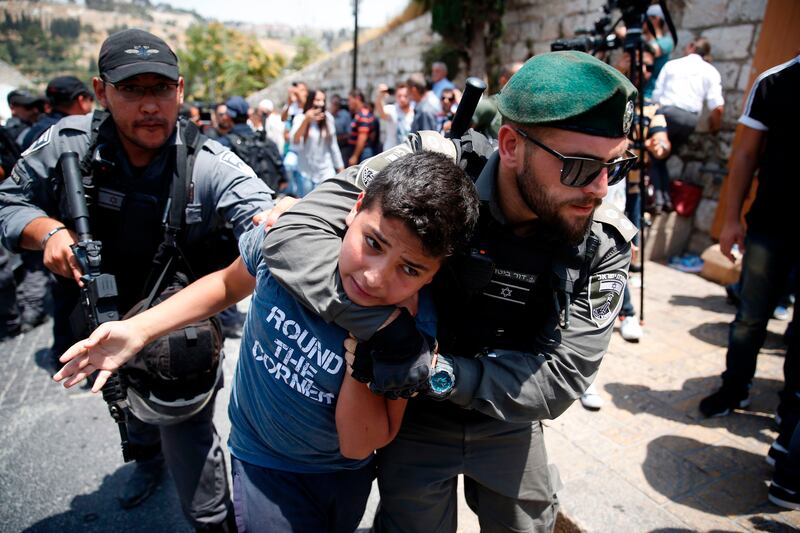The United States on Tuesday urged all sides to reduce tensions that have been building since last week over Israeli security measures at Al Aqsa mosque in Jerusalem.
The state department called for the internationally-recognised "status quo" that has been in place around Al Aqsa for decades to continue, as experts decried the absence of senior US diplomacy on the ground.
It came as the Fatah movement, headed by Palestinian Authority president Mahmoud Abbas, called for a “day of rage” on Wednesday to protest against the new security measures, which include checkpoints and metal detectors at entrances to the mosque compound.
A state department official told The National that the Trump administration is "urging all sides to take steps to reduce tensions".
“We welcome the commitment of all sides to preserve the status quo” on Al Aqsa and “we urge all parties to continue their efforts to ensure the safety and security of this holy site” the official added.
Meanwhile, Ghaith Al Omari, a senior fellow at The Washington Institute for Near East Policy, a DC-based think tank, said, "The situation is still escalating, and continues to be volatile on the ground in a manner that could spiral it out of control”.
Jordan has reasserted its custodianship over Al Aqsa and sees stability at the site and continuation of the status quo there as paramount to the kingdom’s interests.
Mr Al Omari, who was an adviser to the Palestinian negotiating team during the 1990s, said that in terms of diplomacy, “a more charged and accusatory rhetoric is being traded between Israel and Jordan” and that “behind the scenes attempts to resolve it have so far fallen short.”
One of the reasons why diplomatic efforts have failed so far, according to Mr Al Omari, is the absence of the US as an active participant in de-escalation efforts. In 2014, when similar escalation flared up in Al Aqsa, the US secretary of state at the time, John Kerry, intervened directly.
"He flew to the region, and mediated with the Jordanians and the Israelis to contain the situation” recalled Mr Al Omari. “Right now we have seen no high-level US engagement on the issue and it makes it much harder.”
Mr Kerry’s successor, Rex Tillerson, has not spoken by phone to the Palestinians, Jordanians or Israelis about the issue, and his public schedule on Tuesday only included a meeting with the executive director of the International Energy Agency, Fatih Birol.
While several media reports indicated a push by Saudi Arabia to resolve the issue, neither Saudi nor US officials confirmed those reports.
“The Saudis may try to get the US more involved in resolving this” said Mr Al Omari. US president Donald Trump spoke with Saudi Arabia's King Salman bin Abdulaziz on Friday last week, while the US secretary of defence, James Mattis, telephoned Saudi Crown Prince Mohammed bin Salman on Saturday.
Maintaining what has been the agreed status quo since Ottoman times regarding Al Aqsa is critical to diffusing the situation, Mr Al Omari said. “Even minor changes to an inch of the holy site could spiral the situation out of control."
The second intifada was sparked by then Israeli opposition leader Ariel Sharon’s provocative visit to Al Aqsa compound in 2000.
"While circumstances may not be ripe for a third intifada it is unwise not to worry when it comes to Jerusalem,” Mr Al Omari warned. "Especially without visible US diplomacy on the ground.”






